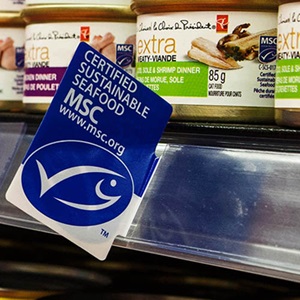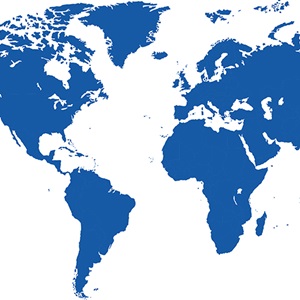In May 2025, the MSC announced changes to the claims that accompany the ecolabel. The changes were made to ensure MSC claims align with new European Union legislation but will impact all partners globally who use the MSC ecolabel.
In addition to our guidance for partners, we have compiled the following frequently asked questions (FAQs) to help support partners in understanding the changes, and what they mean for them.
Does the MSC program meet EU anti-greenwashing requirements?
The MSC is an ISEAL-accredited certification scheme and aligns with the EU’s definition of a sustainability label. Our program is based on a third-party verification scheme, and our ecolabel and sustainability claims are backed by independently verified, science-based certification that demonstrate measurable impacts.
However, as the MSC program does not include social requirements, we need to revise the wording of the claims that accompany the ecolabel on products, packaging and marketing materials.
The revisions provide clarity that our sustainability claims refer to the environmental performance of fisheries and empower our partners to continue to make claims about the environmental performance of their seafood.
What is the new EU legislation?
The introduction of the EU Empowering Consumers for the Green Transition (ECGT) Directive means that products sold within the EU will no longer be able to carry ‘generic’ environmental claims.
The law will come into effect on 27 March 2026, and there is a six-month implementation period, meaning that all changes to the claims must be made by 27 September 2026.
The Directive will require companies to substantiate environmental claims made about their products and services and communicate these claims clearly. This aims to protect consumers from greenwashing and allow them to make more informed purchasing decisions. The Directive also aims to ensure companies are not making generic claims about sustainability, without providing evidence or an explanation.
Which languages will the claim be available in?
The MSC will provide translated versions of the claims text by the end of May 2025 and our new claims will be available in 40 languages.
You will be able to access the translations on our claims page.
Why is the MSC requiring all licence holders to use the revised claims?
While EU legislation is prompting the changes to our claims, we are rolling this out globally to reflect best practice moving forward for credible environmental claims. Our aim is to maintain a leading global certification and ecolabel program with claims our partners can have confidence in, and this is best achieved with maintaining one consistent approach across the globe.
It is also in recognition of the changing landscape in many other markets as sustainability claims come under increasing scrutiny. The changes are intended to help future-proof our claims to reflect evolving best practice and in anticipation of potential changes to legislation in other markets to prevent greenwashing and making unverified sustainability claims.
How can consumers and market actors trust the new set of MSC claims are compliant with legal requirements?
We are proud of the credibility of the MSC program and want to continue to build trust in our label among retailers and consumers. The revisions help strengthen our claim and enhance consumer understanding of what MSC certification means. This process on updating our claims means that we are confident in our compliance with EU law designed to support consumers in the ‘green transition’ and offer a strong value proposition to partners making environmental claims on seafood. We are the only wild seafood ecolabel organisation that meets ISEAL requirements enabling our partners to benefit from use of the ecolabel while demonstrating compliance with EU law.Why is the MSC requiring changes now?
We want our partners to have as much time as possible to change the claims on their packaging before the new law comes into effect, and in recognition of the possible costs and resource associated with updates to packaging as a result of revised claims. All packaging for products being sold in the EU must carry the new claims text by 27 September 2026.
What is the timeline for non-EU countries who do not export into the EU?
As the timelines set out in the EU legislation are not applicable to partners operating outside of the EU, and not importing into the EU, these partners will have more time to make the changes. MSC recommends that partners should move to the new claims as soon as is reasonably possible – e.g., when launching new products or when they are updating their packaging artwork for existing products.Will the European Commission publish further guidelines on how to implement the directive?
As we understand it, there will be no further guidelines published by the European Commission, however, they are considering publishing an FAQ document to help traders with the implementation of the Directive. This FAQ not be legally binding and currently there is no confirmation if and when a supporting FAQ document will be published.Will the new EU rules apply to existing product inventory packed prior to September 2026?
The new EU legislation does not specify what traders should do about packaged products that are already in the supply chain or on retailers' shelves. It simply states that all claims made by traders must comply with the new rules by 27th September 2026.
The MSC raised this point with the European Commission. They referred to the Directive text, which states that the end of the grace period (27 September 2026) marks when all claims in the market should be in accordance with the legislation. As the responsibility to comply sits with the trader using the claim, partners may want to check with their relevant regulatory authority to determine if further guidance on this matter will be issued.
What happens if partners do not comply?
The Directive amends existing Directives of the EU, which provide for various sanctions. Depending on the member states’ implementation of these Directives, sanctions could be fines, cease and desist, and removal of non-compliant claims from the market. Enforcement of these sanctions varies across member states, and could be administrative or court proceedings.
Partners may wish to check with the regulatory bodies in the relevant member state for more information.
Can partners continue to submit new artwork approvals with the old claim?
We recommend that all new artwork submitted for new products should use the new claims.
As new product artworks are submitted in advance of the product being launched, we feel that most partners will be able to incorporate the new claims text in their artwork. However, we appreciate there may be specific reasons why this is not possible so we may approve the use of an old version of the claim.
Does artwork on existing products require MSC approval if it is redesigned to only accommodate the new claim text?
If the only change is the updated MSC claim, the Licence Holder may implement the change without notifying the MSC Licensing Team.
For Licence Holders with internal policies requiring written artwork approvals, the MSC Licensing Team can provide a formal letter stating that re-approval is not necessary.
If the Licence Holder makes any other changes beyond the MSC claim text, the updated artwork must be resubmitted for approval in line with the standard process. Such changes include:
- Changes to the MSC ecolabel or Chain of Custody code
- Changes to the seafood species used
- Changes to marketing text about MSC or other seafood certification schemes (this excludes unrelated certifications or logos such as NutriScore, recycling labels, or FSC, which may be changed under new EU labelling regulations).




